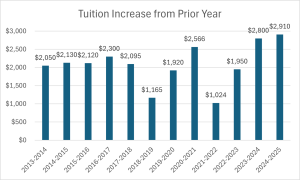When I think of eating disorders, I usually don’t think of college students. I think of teenage females having a difficult time going through high school. This type of thinking is a stigma that needs to be eliminated. Visiting the Renfrew Center has reminded me of the effect that eating disorders have on a wide variety of people.
The Renfrew Center is the first clinic solely dedicated to treated people struggling with eating disorders, including anorexia nervosa, bulimia, binge eating, and more.
The Renfrew Center has been around for over 30 years, and has recently opened a new location by UCF. They have the largest network of eating disorder treatment centers in the nation, treating over 75,000 women throughout their history at eighteen different locations.
I was able to speak with Paula Edwards-Gayfield at the UCF location about the ways that eating disorders affect college students. Paula said that the average age of those visiting Renfrew for treatment is twenty years old. This goes against the stereotype that eating disorders are a problem strictly for high school students.
Paula mentioned that for college students, certain behaviors become socially acceptable that might have been suspicious in high school; behaviors such as constantly exercising or dieting to the point that it is no longer healthy, but harmful to your body. “Even though this isn’t truly a diagnosis in the DSM-5 [the classification manual of mental disorders],” Paula told me, “things like orthorexia… when I think about college campuses I think about orthorexia.” Orthorexia is marked by obsessive behavior in maintaining a healthy diet.
Although orthorexia may seem like a nonissue, considering it’s an obsession with eating healthy, it can often lead to impairments. Many suffering from orthorexia will refuse to eat anything that they don’t consider “pure,” starving themselves when the food around them is deemed unfit. Orthorexia is not an obsession with being thin, such as anorexia, but an obsession with being healthy to the point that it’s no longer good for you.
“Drunkorexia,” Paula later said, “I don’t know if you’ve ever heard of that before… it really is a street term… for where we would see patients restricting their food intake to be able to binge drink.” This is a big problem on a lot of college campuses. Students that are interested in losing weight but still want to drink will starve themselves before drinking, so their calories come only from the alcohol. This often leads to students consuming an extreme amount of alcohol to vomit up previous meals, or binge eating later in the night when they are drunk.
Although orthorexia and drunkorexia exist on college campus, there are still many instances of the most infamous eating disorders. The Renfrew Center understands that college students may have a difficult time coming to them since students are often away from their families. Renfrew offers programs where you can speak one-on-one with therapists and dieticians, as well as have group sessions with friends and family to make the process easier.
While the Renfrew Center provides treatment for women, any males seeking help for eating disorders can call Renfrew, and they will connect them to different resources for men seeking help.
Paula says the goal of Renfrew is to empower women, and challenge them to step outside of their comfort zone to embrace a healthier and happier lifestyle. If you have any questions about eating disorders or seeking treatment, definitely give the Renfrew Center a call at 704-285-7644.













Be First to Comment